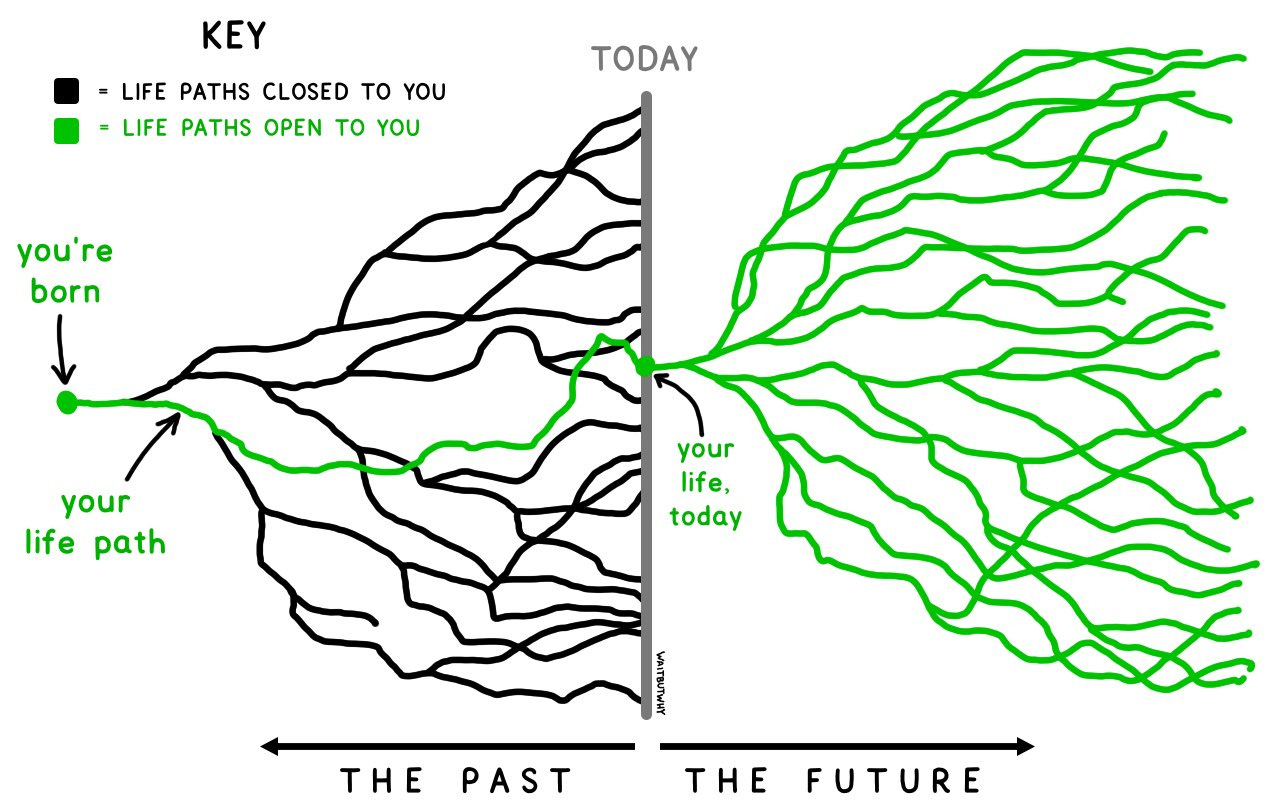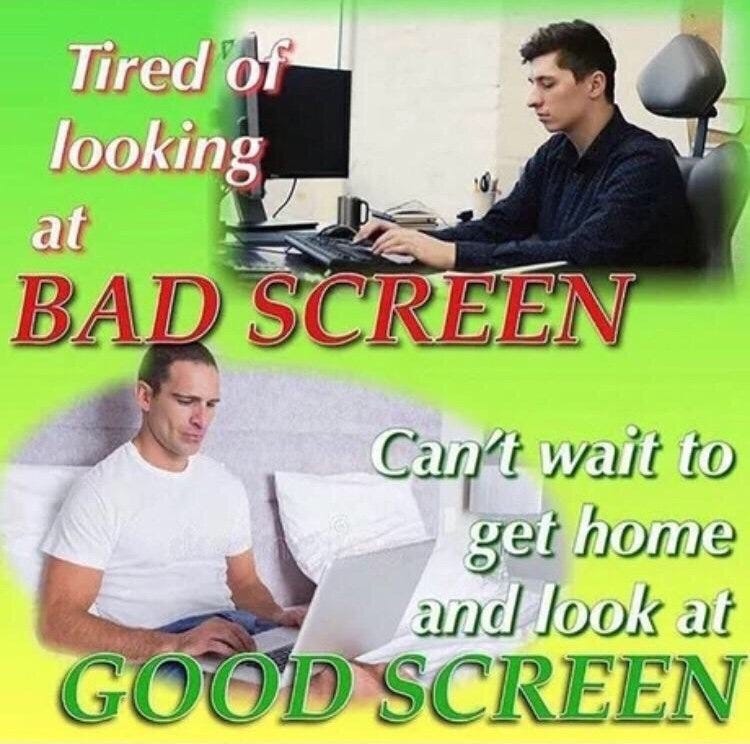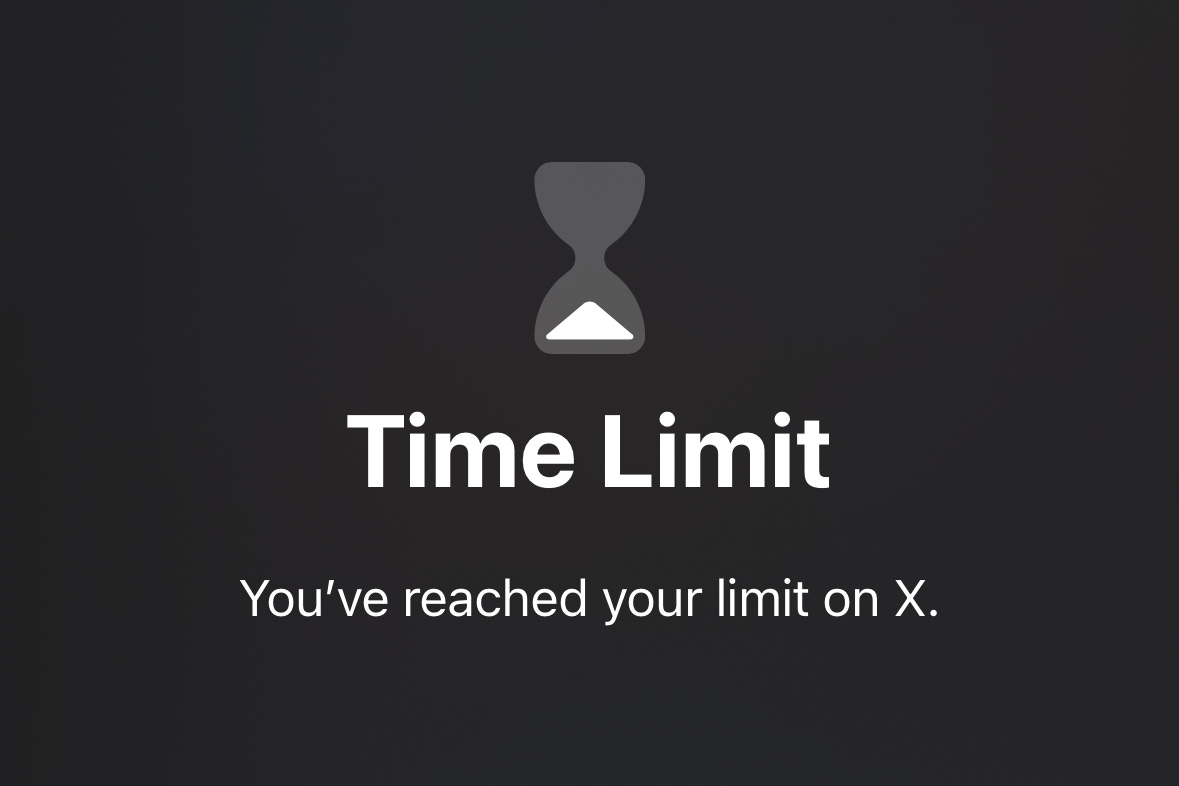2,500 Books To Go
The clock is ticking, and attention is all we have.
I had this thought the other day: How many more books will I be able to read before I die?
I’m 33, so thoughts like these occasionally rumble into my awareness like early warning tremors before a midlife crisis.
According to the United Nations, I’ve probably got about 50 years left. The chart below doesn’t differentiate by gender, race, or income. But—finger in the wind on this one—I figure I can safely plan to be dead by 83, and anything after that is bonus time.

I usually manage to read or listen to about 50 books per year, a pattern that’s held consistently since my early 20s. So the math here is easy: 2,500 books left until closing time.
How, then, should one choose what to read in this limited life?
Maybe we should widen the scope beyond books, which are of course only a small part of what makes life worth living. Most of life comes at us as a river. We constantly make choices about how to navigate its swirling possibilities. But we know we don’t have enough time to see everything. So to keep from getting overwhelmed, we adopt habits and routines that reduce the chaos into something manageable. To keep our heads above water, we pick a direction and swim.

We can’t quantify or optimize every choice. Most choices—including what we read or watch or play today—aren’t actually going to cause our life’s path to diverge in any meaningful way.
So does the book we choose to read today really matter?
Maybe we’ve zoomed out too far.
Pinch back in and we see that, on a day-to-day level, we spend a meaningful chunk of time absorbing information on screens.
The screentime app on my iPhone accuses me of spending an average of four hours a day staring at the device—too much. I don’t want to believe it, but I know it’s not even a fraction of my actual daily time spent in front of screens, a fact that always makes me think of this all-time banger tweet from Substacker Delia Cai:

Though written in a self-deprecating, first-person framing, there’s an implied admonishment for the rest of us: You’re reading this on your little screen right now, aren’t you? You just go through each day thoughtlessly trading one screen for another.
The joke is on us: maybe we’re not exercising enough agency over our own lives?
Suddenly it seems a lot more important to ask questions like how much time should I really be giving to screens? Or, as a subset of the question of how to spend our time: which books should I read?
The clock is ticking. 2,500 books to go. Shouldn’t we try to choose the contents of that towering bookstack thoughtfully?
The Information Deluge
For thousands of years, authors have agreed that there are too many books. The author of Ecclesiastes warned that “Of making many books there is no end, and much study is a weariness of the flesh.”1
But now there’s too many of everything.
Earlier this week I opened up my podcast app and realized that I was at least three or four episodes "behind" on each of the 12 shows I’m subscribed to. Along with the weekly shows, I had like 80 downloaded episodes from two different history podcasts. I thought, when the hell am I actually gonna have the time to listen to this?
Unread books pile up around my office. My Audible app offers me thousands of hours worth of books available at a touch. There are at least 100 unplayed games in my Steam library, and of course, I’ve got subscriptions to three different video streaming services, each with ten thousand movies and tv show episodes on demand.
It wasn’t always like this. Twenty years ago, there were maybe 12 good podcasts. Sure, there were plenty of movies and music to choose from, but it cost a lot more to acquire stuff, and you never felt like you were overwhelmed with entertainment options. For video games in particular, there was a time when it felt reasonably achievable to play all of the good games.
My first console was the Nintendo 64. In the US, there were only 296 games released for it in total across its five-year lifespan. Not quite 60 games per year. So if you lived near a well-stocked video rental store and went every weekend, you could easily play every decent game ever released for the system.2
Culture accelerated in the 2000s. The PlayStation 2 hosted over 4,000 games. The PS3 had as many as 5,000 depending on who you ask. Since the App Store launched in 2008, nobody’s been able to keep a clear count of all the mobile games, but it’s at least in the hundreds of thousands.
This year alone there were just over 19,000 new game releases on Steam—the vast majority of which will never be played by more than a few hundred people.

We have all these options for entertainment, but somehow manage to burn hours every day looking at irrelevant information. Many argue that our phones are the problem, and there’s a lot to be said for that. But—speaking for myself—it feels bigger than that. I’m starting to think that in order to get what I want out of life, I have to intentionally close myself off from way, way more of what the internet has to offer.
For the first few decades of online life, it seemed harmless to train one’s attention on feeds, timelines, even curated front pages. Now that feels like allowing your brain to be DDoSed by entities unknown and unworthy of the trust handed them.
This year, I want to take more walks, exercise more, and spend more time goofing around with my kids. Less doomscrolling, more deep reading. Call it a New Year’s Resolution: I want to exercise more agency about where my attention goes, including for the things I read, watch, and play.
Attention is All We Have
I think the only solution to this problem is to actually decide what it is we value. What do you love spending your time doing? This feels like such an old, stuffy idea, but it has clarifying power. So few things are worth living for—so when you find something you really love and value, you owe it to yourself to explore it.
Two examples: For books, I love going down historical rabbit holes. Recently I’m loving books about the early phases of religions: For the Protestant Reformation, From Dawn to Decadence by Jacques Barzun was great, or for the history of early Islam, I loved Destiny Disrupted by Tamim Ansary. Sam Kahn’s series on early Mormonism was another winner.
For games, the ones I love most are the genuinely novel artistic experiences that let me experience something I can’t in the real world (last year this was Arctic Eggs, UFO 50, and Arco). But I also love story-light “systems” games that fully submerge my conscious mind and trigger a flow state (e.g. Pseudoregalia, Minishoot’ Adventures, and JUMPGRID).
I don’t have that much time to spend on games. There are plenty of things that take precedence over them: family, work, friends. But some games are worth the attention they demand. So this year I want to try more weird indie games—the sort with a few thousand “overwhelmingly positive” reviews on Steam. I’ll probably write about these.
Weird old history books and indie games don’t seem important to most people. But they’re important enough for me that I’m willing to miss out on other things. Maybe for you it’s gardening, cooking, or competitive Big Buck Hunter. Whatever it is, we have to find a way to focus in on the things that matter to us without getting drowned in the deluge of information and options.
We have to pick a path through.
That’s it for this week. I’m gonna go spend six hours reading about the history of competitive Big Buck Hunter.
I’ll see you next Friday.
Ecclesiastes 12:12, ESV
I just found some random forum user’s “top 100 N64 games” list and, yeah, the only one I haven’t played is Body Harvest.






My 2025 resolution is a vague “Spend my time well,” which also means answering what “well” means for me. I am constantly overwhelmed by the possibilities, the limitations of my time, and the capitalistic bids for our attention everywhere we turn. By your math I have fewer than 2,500 books, which makes me sad.
What I’m trying to get ahold of is the intention in where my attention goes, not letting time slip away to scrolling and other mindless things - which runs the risk of becoming an optimization project and isn’t the point. It’s figuring out what you want and need and giving yourself the time and energy to devote to those pursuits.
Good luck on your intentions!
I feel this - I'm not usually one for new year's resolutions but this year I've unplugged my internet router and left it at my parents' house. No Internet connection while I'm at home anymore. When I need it I'll have to go to a cafe, or the library, or make use of my downtime at work (which is what I'm doing now). It really got to the stage for me where I had to ask myself how long I was going to let myself keep living in this state of constant distractedness. I'm so sick of it. I think more than anything in 2025 I'm looking forward to being bored again, what a blessing that will be! (Luckily, since I live alone, I'm able to get rid of my router if I want to, without forcing anyone else to give up the great modern home comfort with me).
I am hopeful as well though that giving myself more time will let me play a few more games without the side-helping of guilt that's nagged at me for the past few years whenever I've done so. I played Outer Wilds a couple of years ago and was reminded of the kind of profound experience a great video game can provide. Exactly the kind of experience I'm hoping to leave myself open to with the time I'm giving back to myself.
Anyway, happy new year, and I hope your resolution goes well for you too!